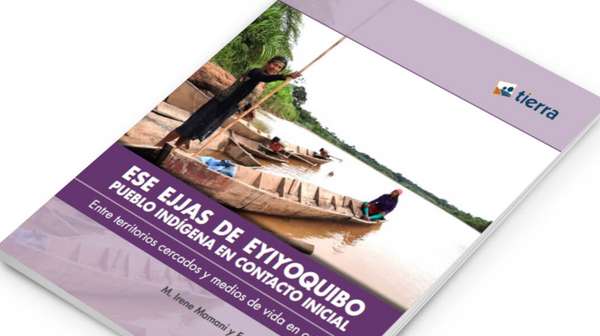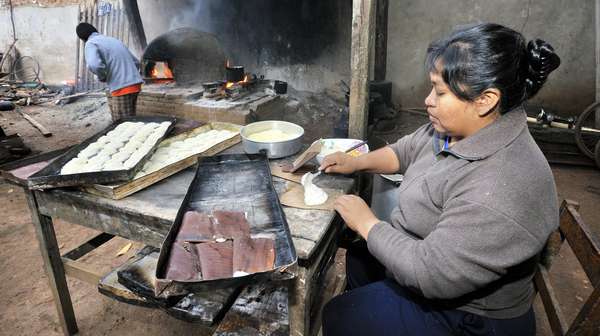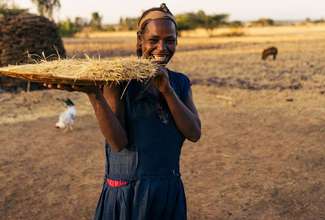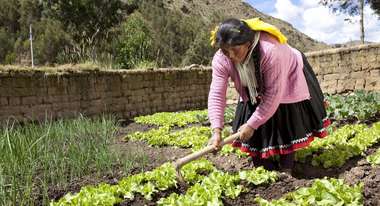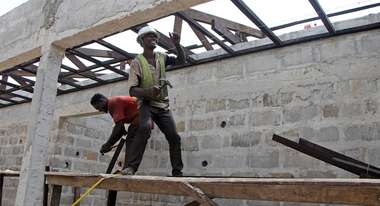This report analyzes the threats to the Esse Ejja community of Eyiyoquibo, an indigenous tribe located in the Amazon rainforest in Bolivia. Fundación TIERRA published the report with the support of Welthungerhilfe. It is only available in Spanish.
The Esse Ejjas women: community efforts to protect the rights of the indigenous peoples in Bolivia
The Esse Ejja community of Eyiyoquibo is an indigenous tribe located in the Amazon rainforest in Bolivia. The women of this community play a vital role in preserving their threatened livelihoods that are largely dependent on the river.
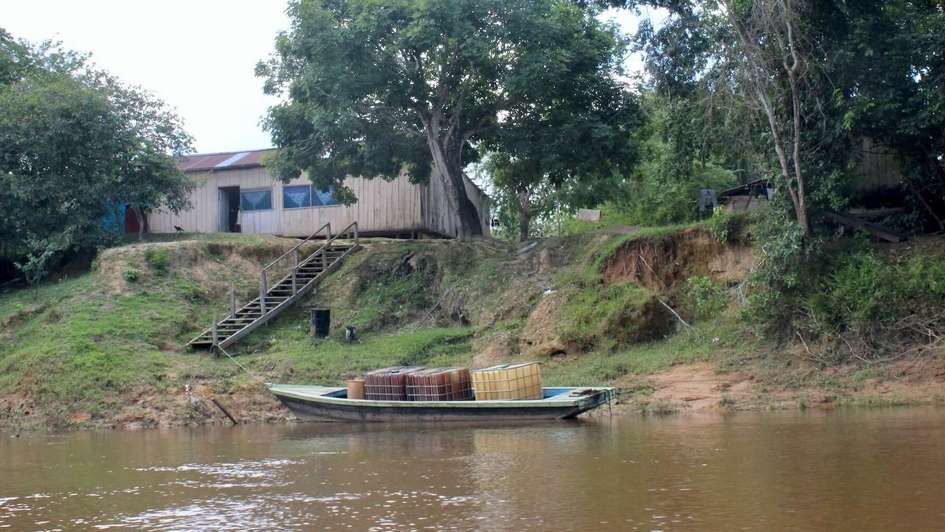
The Esse Ejja women are actively involved in fishing and farming, as well as other traditional practices. The community is currently facing serious challenges due to the increasing pressure on their land and livelihood. Fundación TIERRA, with the support of (Welthungerhilfe) WHH, has published a report which seeks to analyze and understand the threats to the community's traditional way of life, food security and even existence.
The TIERRA report raises the challenge of considering policies and protocols specifically designed for relations with communities as vulnerable as Eyiyoquibo. It calls on the various actors involved in the region to reflect on the impact of their presence on the life, culture and means of reproduction of the community, and to adapt them to minimize the negative effects that could be generated in their surroundings, such as the contamination of rivers. Finally, it draws attention to the issue of indigenous peoples' land tenure and the complex situation of the Esse Ejja people, who have been increasingly marginalized and neglected in their territory.
Fixed settlement endangers traditional livelihoods
The Esse Ejjas community are considered indigenous people in isolation and initial contact (PIACI) and nomads with a spiritual and economic tie to rivers. Rivers have been their source of life for generations, providing them with food and means of transportation. It was, however, this connection to the river that posed a problem for the Bolivian state during the 2006-2010 sanitation process, which entailed a process of legalizing land and granting property titles. It was unclear if giving the Esse Ejja community a specific territory would improve their living conditions, as they are nomads.
The last 30 years have seen the growth of urban areas, roads, and private and public development projects that have cornered many of these communities, threatening their culture, language, and even their very existence. Without proper legal protection and recognition, the Esse Ejjas and other nomadic peoples are at great risk of being left behind by modern society. In 2021, the state simply gave them the right to settle in specific areas, without any protocol for “initial contact” that respects their culture. This action disregards the cultural significance of the land and puts these people in danger of being forgotten.
Currently, there are eight Esse Ejjas communities in Bolivia. The Eyiyoquibo community is located in a seemingly peri-urban ghetto in 27 state-built houses with scarce basic services, where around 400 inhabitants live. They have been reduced to a fixed settlement, which implies that they have been forced to adapt to new ways to survive and move away from their traditional livelihoods.
The vital role of women
The women in this community face the triple burden of discrimination – being indigenous, poor and female. In addition to the gender-based roles assigned to them, such as child keeping, food collection and wood gathering, they are now shouldering the additional burden of domestic work due to their more permanent residence in settlements. These women are further disadvantaged by the multiple crises afflicting their community, such as a lack of monetary income and the contamination of rivers caused by mining activities. The average birth rate of eight children per woman causes well-being and education issues. For example, there is a high rate of children dropping out of school.
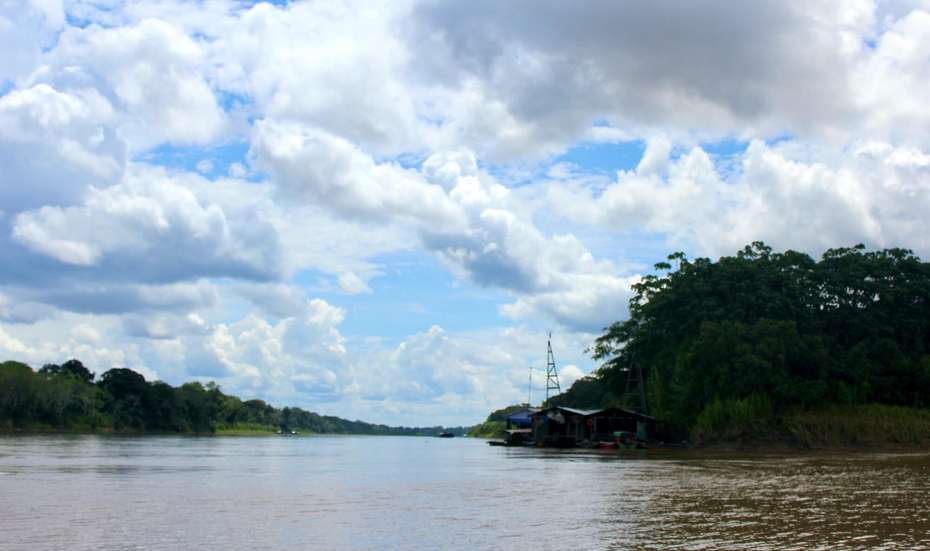
The men in the community are away for lengthy periods fishing to sell what they can in local markets. Finding themselves isolated and with so many children to care for, women must explore alternative sources of survival. One of these activities is creating handmade crafts from palm leaves and jipi japa leaves, a local tree species. However, this task is becoming increasingly difficult, as they must cross private properties to find the required trees for collecting the leaves. This often leads to disputes with the landowners, who label the women and children thieves and unfairly stigmatize the entire Esse Ejjas community as vandals.
Other activities include selling honey and recycled waste to the municipal dump. Most women speak only in their native language, which lowers their chances to negotiate and bargain. Sometimes they must walk to nearby urban centers to find whatever job they can find. Overall, women have proven to be economically self-sustainable, but this comes at the expense of an overload in domestic work, the undervaluing of their economic role, and social discrimination.
Resilience in the face of adversity
When food is scarce and the community is facing hunger, these resilient and courageous women, also often turn to fishing. Unfortunately, the closest fishing locations of their community have been depleted due to overfishing and the toxic waste of gold mining, leaving them with little to no catch. Recent studies have also found extremely high levels of mercury in the water, a toxic waste of gold mining, making it a potentially hazardous health issue that is just waiting to explode. In addition to fishing, women are turning to traditional plantain and rice harvesting for sustenance. But, due to the limited size of the assigned lands, there is very little chance for expansion. This has led to an eventual scarcity of resources. To combat this, women are learning new techniques to sow diverse crops and raise farm animals to sustain their communities.
Bolivia - A country on the upswing? But the indigenous population and smallholders cannot profit from the economic growth.
The state has recognized the community's need for more land and plans to assign more hectares of land through a “participatory” process to manage the communitarian territories. Ironically this process does not include many women (from a list of 27 beneficiaries there are only six women who do not even know the new land areas nor the possible advantages). Some women have said that they wish to farm the land in line with economic activities that they have learned with so much effort. However, the women do not have political representation within their communities and are not aligned with regional women's organizations. Therefore, it is tough to make themselves heard in decision-making spaces.
A typical day for the women of the Eyiyoquibo Esse Ejja community only ends at 11 pm, after a long day of hard physical work and care for their families and children. There are no breaks during the weekends or holidays, for their work is a fight for the survival of their slowly disappearing culture. Despite being excluded from decision-making processes, these women are shining examples of resilience and adaptability. Against all odds, they have taken on essential roles in transmitting values, providing emotional and economic support for their families, and preserving traditions. They are the guardians of a slowly fading culture, but with their strength and resourcefulness, there is hope that they can instead ensure its survival.





